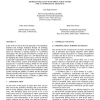14084 search results - page 81 / 2817 » A Theory for Game Theories |
IPL
2006
13 years 8 months ago
2006
We present a Coq-formalised proof that all non-cooperative, sequential games have a Nash equilibrium point. Our proof methodology follows the style advocated by LCFstyle theorem p...
ICASSP
2011
IEEE
12 years 11 months ago
2011
IEEE
We propose the energy efficient MAC algorithm in this paper. In the proposed algorithm, each node sets the contention window size with respect to the residual energy, the harvest...
ICAPR
2005
Springer
14 years 1 months ago
2005
Springer
There is need for more formal specification of recognition tasks. Currently, it is common to use labeled training samples to illustrate the task to be performed. The mathematical ...
NOSSDAV
2005
Springer
14 years 1 months ago
2005
Springer
We are concerned with the fundamental problem of event ordering in multiplayer peer-to-peer games. Event ordering, even without faults, requires all-to-all message passing with at...
WSC
2000
13 years 9 months ago
2000
In this work we want to show the importance of visualization, interfaces and re-design techniques through 3D modeling, animations and VRML in the developing of the simulation game...

